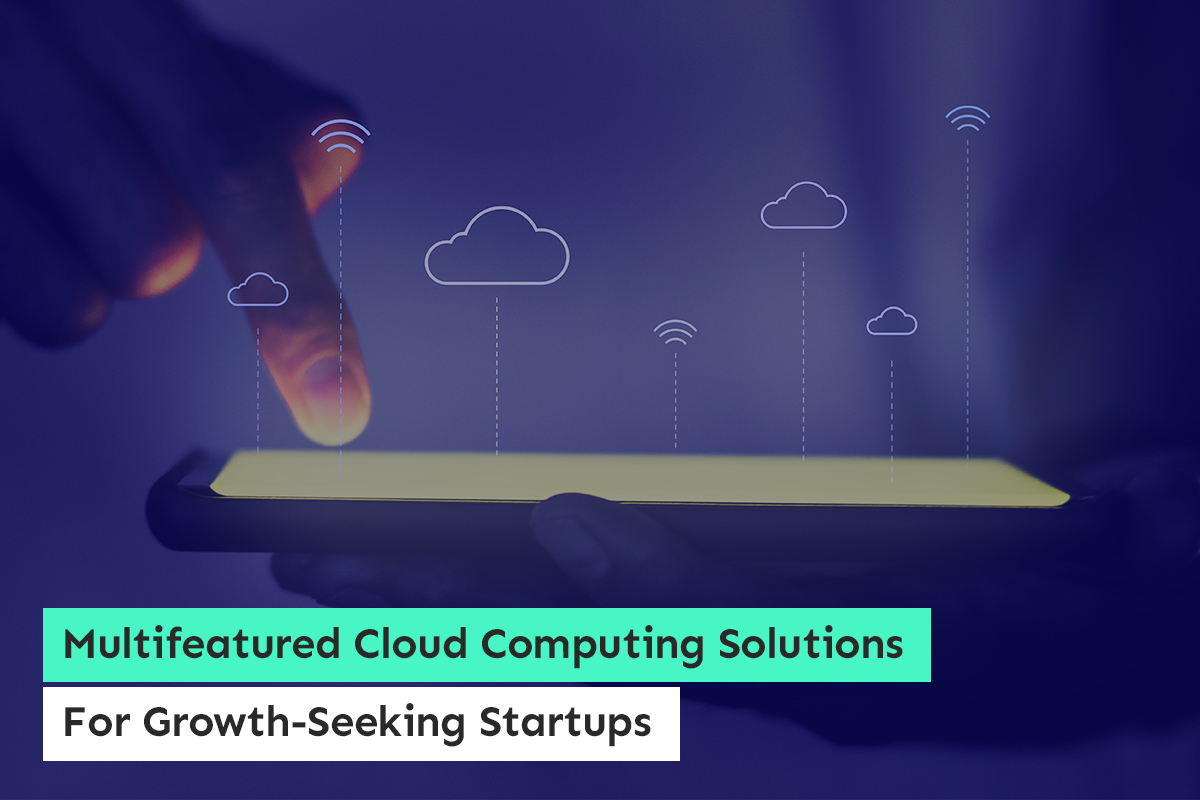Powerful Benefits Of Cloud Computing With AWS

Cloud computing is a game-changer for businesses, is an understatement. The technology has been around for over two decades and has been the backbone of prominent companies of today.
Amazon, Facebook, Instagram, Gmail …all of these giants use cloud computing technologies. But despite the success of cloud computing combined with data indicating business efficiencies, cost merits, and profits, businesses are still operating without it.
But the covid – 19 pandemic has accelerated cloud adoption rates among enterprises. Without any doubt, this upward trajectory of cloud infrastructure will keep on rising in 2022. As per cloudwards, a staggering 94% of businesses use cloud services. The global cloud computing market will hit $832.1 billion by 2025.
These statistics clearly indicate that companies heavily invest in cloud, big data, and data security. Many business leaders and industry-leading companies acknowledge the benefits of hosting data on the cloud. Enterprises are catching up to the cloud computing trend to beat their competitors.
The advantages of cloud computing are not limited to storing data. It also helps business people to run their organization efficiently, provide better customer service and generate more profits. The cloud computing industry is at its peak, and there has never been a time better to invest in cloud services.
Even though cloud computing means storing data on a network of servers accessed via the internet, the use of this technology has spread over too many business requirements, including Data Security, business digitization, and operations.
As the world moves blazing fast into digitization, there is an exponential need to make data safe for individuals and enterprises. Keeping the in-house servers up and running with such large data volumes has a high cost to bear. The solution to this problem has always been the cloud, but only recently has the technology spread like wildfire among businesses.
Cloud computing is similar to the social media or email principle where the users can access all the info, features, and uploaded files without storing them on their devices. Customers and businesses are already using many cloud services like Gmail, Facebook, Twitter, google drive, and many others. Users upload their data on these cloud-hosted applications for access later.
And like other cloud-based applications, AWS is also a cloud computing platform that helps businesses manage large volumes of data. AWS helped amazon build a massive infrastructure for the web, host everything without servers and manage everything on a single dashboard.
With AWS, you don’t have to go through the hassles of maintaining servers, office rent, and electricity bills. AWS offers a pay-as-you-go service that does not require you to go to and fro with servers.
Big brands like Netflix, Reddit, NASA, and others use AWS to host their applications. AWS is an excellent tool for all IT operations, infrastructure, and workflows.
For businesses, AWS is a budgeted tool to store and access sensitive data with a secure online connection. Still, some organizations are hesitant to use the full range of these cloud-based services. Here are the top benefits of cloud computing with AWS.
1. Fixed expense for variable use
Organizations are worried about the heavy investment in setting up data centers and servers. With AWS pay as you go model, you don’t need to worry about the initial cost at all. When it is time to scale, choose the plan per your expansion requirement and pay for cloud resources your organization consumes.
If you’re worried about the cost it will incur to switch to the cloud, AWS is a cost-saving option. Before they decide to go for cloud computing, the main concern of businesses is the initial cost. But rather than thinking in terms of price, think about the ROI.
Once all your business data is on AWS, the employees can access it anytime, speeding up the startup process. And you don’t even have to pay for the extra features, which means you only drop money for the business-oriented services.
AWS also offers to pay as you go for data storage space, and you are charged for the space you need and nothing more. The pay as you go combined with other features makes AWS the light bearer of lower costs and high ROI.
2. Costs advantages of massive economies of scale
AWS is a worldwide cloud service provider. With so many businesses on board, the cost per consumer decreases drastically, giving you a lower variable cost that is impossible if you establish your servers.
The production and maintenance cost for AWS lowers significantly as the numbers of vendors increase for cloud services. The accumulated cost of hundreds of thousands of customers achieves higher economies of scale for AWS, which gets the lower pay as you go prices for customers.
3. Sustainable solution

By 2015, AWS was operating on 25% renewable energy, and by 2025 they are aiming to run the cloud service on 100% renewable energy. Given the climate condition, it is not enough for businesses to install recyclable dustbins in the office and claims to be environmentally responsible. AWS provides a real alternative for companies to use sustainable products.
4. Speed, agility, and flexibility
Cloud computing environments make resources available in a few clicks, and developers can access new trendy features in minutes, increasing the viability of the product. For your business, this means faster deployment since the time and cost for the experiment is reduced.
AWS takes away all your pain of managing data storage and server issues. Your organization’s focus is not divided among unnecessary responsibilities, which helps you focus on business goals. Your business results rise higher with more time to focus on the customer’s needs rather than the IT hosting infrastructure.
An AWS hosted server offers more flexibility than a local server with extra bandwidth. And for any emergency or an unplanned project, you are free to buy as much space as you require. The data storage space is practically limitless with AWS. Such high degrees of freedom and flexibility can make the difference that puts your business above others in the market.
Also Read: Micro Services Vs Web Services
5. Deploy around the globe in minutes
How much would you have to pay to gather real-time feedback on a new product from a global audience? A lot, right?
Well, with AWS, this is possible in just a few clicks. You can deploy an application in many regions and offer a better experience at a minimal cost.
6. Mobility
Cloud computing with AWS offers mobile access to corporate data, which today is a great way to ensure that no one is left out. Covid has proved that any situation can arise, and your business should be prepared for it.
Staff who live away or with busy schedules can access all the updates on mobile about clients and projects. Cloud computing with AWS conveniently offers a better work-life balance for remote employees and staff who are always on the run.
This should come as no surprise that more and more organizations will be shifting to the cloud soon.
7. Crush the competition
Even though cloud computing popularity has skyrocketed, there are still those who are yet to decide. It’s their decision to stay local, but getting a cloud-based solution first will take your profits further along the curve.
On the other hand, if you still take time to pull the trigger on cloud computing, you will end up placing enterprises at a distinct disadvantage.
Quick wrap up
Are these the only benefits of AWS? Absolutely not!
AWS cloud computing is way more than a service. Over the years, AWS has proved to be a valuable tool to increase operations, collaboration, productivity, profits, and much more—all of this at a minimal price.
Need a personal call before starting your cloud journey? Feel free to ring us anytime.
Similar Posts

Microsoft Azure vs. Other Cloud Platforms: Why Expert Developers Make the Difference
Now, with the help of cloud computing, a small startup in Silicon Valley can compete head-on with world giants. No need for a vast server room, no necessity for huge investment upfront – just pure, scalable technology at your fingertips. The heart of modern business innovation lies in cloud computing. By the year 2027, it […]...

Multifeatured Cloud Computing Solutions For Growth-Seeking Startups
Unlike giant tech companies, startups are based on innovative ideas. Their teams develop a product the world hasn’t seen before. Startups are new businesses, Usually led by an enthusiastic young team excited to launch their idea into the world with a clear goal in sight. But also, unlike big tech companies, they lack funding, resources, […]...

Top Trends of DevOps in 2023 and Beyond to Watch Out
Did you know? DevOps is the most popular technology trend. And the reason for that is its reliability in aiding organizations in boosting output, cutting downtime, and encouraging collaboration....










